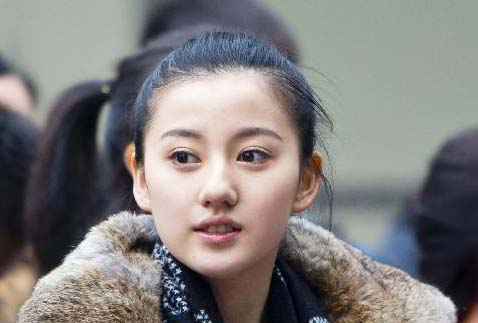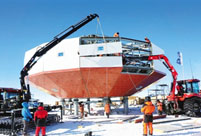 Deng Xiaoping: 'I have a clear conscience all my life'
Deng Xiaoping: 'I have a clear conscience all my life'
 Xi Jinping: 'The people are our strength'
Xi Jinping: 'The people are our strength'
 Amazing cliff diving in cold winter
Amazing cliff diving in cold winter
 Enjoy Sochi 2014 in slow motion
Enjoy Sochi 2014 in slow motion
 University student sentenced to death for poisoning roommate
University student sentenced to death for poisoning roommate
 Chinese lunar New Year celebrated in San Francisco
Chinese lunar New Year celebrated in San Francisco
 Taiwan Lantern Festival 2014
Taiwan Lantern Festival 2014
 Haiyang Yangge: make up
Haiyang Yangge: make up
 China's top 10 richest cities
China's top 10 richest cities
BEIJING, Feb. 27 -- China's upcoming annual sessions of the National People's Congress (NPC) and the Chinese People's Political Consultative Conference (CPPCC) have drawn the attention of the world as a window on the country's political and economic development.
At a time when the global economy is struggling to recover and restructure, Chinese economists, deputies to the NPC and members of the CPPCC are confident China's economy will overcome difficulties and make new strides in 2014, a year that marks the beginning of comprehensively deepening reforms and opening-up.
They say this year's two sessions will lay a new blueprint for China's economic and social development and that the Chinese economy will succeed in both development and reform.
CRUCIAL PERIOD FOR ECONOMIC TRANSFORMATION
In the context of a complicated and volatile world market last year, the Chinese economy witnessed a two consecutive months of decline.
However, thanks to Chinese policymakers' strategy of making progress while maintaining stability, market confidence was obviously shored up from the beginning of the second half of 2013.
Economic growth finished at 7.7 percent last year, making a good start for China's socioeconomic development and laying a solid foundation for further progress in 2014.
In 2013, China's total imports and exports reached 4.16 trillion U.S. dollars as it overtook the United States as the world's largest trading nation.
A historic change also took place in the country's industrial structure, with the service sector exceeding secondary industry for the first time. Meanwhile, consumption overtook investment to become a driving force for economic growth.
In addition, the consumer price index (CPI), a main gauge of inflation, rose 2.6 percent year on year, far below the government's target of 3.5 percent. A total of 13 million new jobs were created, higher than the target of 9 million, with per capita net income of urban and rural residents remarkably increasing.
These achievements showed China had taken a "substantial" step in economic restructuring, said Jia Kang, director of the Institute for Fiscal Science Research under the Chinese Finance Ministry.
Jia, also a CPPCC member, said that, in the face of ever-changing world economic situations and downward pressure on the national economy, Chinese leaders' strategy of stabilizing growth, restructuring and promoting reforms helped the economy realize steady growth and play the role of "a stabilizer" for the global economy.

 Chinese Dream: the Chinese Spirit and the Chinese Way
Chinese Dream: the Chinese Spirit and the Chinese Way 51 bronze sacrificial utensils unearthed in Shaanxi
51 bronze sacrificial utensils unearthed in Shaanxi Most gorgeous female celebs in Chi-pao
Most gorgeous female celebs in Chi-pao Second round of test kicks off at Beijing Film Academy
Second round of test kicks off at Beijing Film Academy Ancient Qiang people had vertically grown teeth
Ancient Qiang people had vertically grown teeth Top 10 Chinese youth’s favorite seaside destinations
Top 10 Chinese youth’s favorite seaside destinations Traditional Tibetan clothing tailors
Traditional Tibetan clothing tailors In photos: Unveiling Taishan station
In photos: Unveiling Taishan station Beautiful moments of family reunion
Beautiful moments of family reunion Chinese warplanes C919 to appear at Singapore Airshow
Chinese warplanes C919 to appear at Singapore Airshow Ruins of Shang Dynasty's structure unearthed in Shaanxi
Ruins of Shang Dynasty's structure unearthed in Shaanxi  Intercity high speed train in operation
Intercity high speed train in operation Severe coldness freezes large parts of China
Severe coldness freezes large parts of China  Beautiful moments of Sochi
Beautiful moments of Sochi  It's not just performing this year
It's not just performing this yearDay|Week|Month